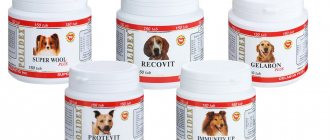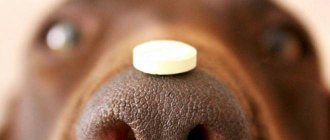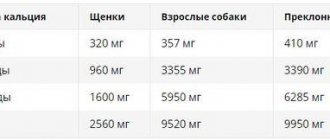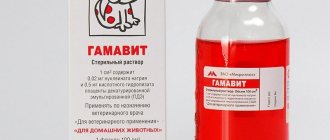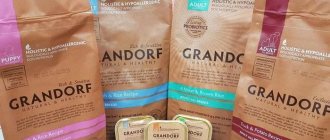Vitamins include biological active substances necessary for a number of metabolic processes in the body and to ensure important biochemical reactions. Such substances have no nutritional value, but without them the normal functioning of the body is impossible. They are akin to enzymes, catalysts of biochemical reactions. And they are needed in micro quantities. Vitamins can enter a dog’s body through food. Nutritional supplements for dogs have been created for the same purpose. Some are able to be synthesized within the body. Then their intake with food is not necessary. In large quantities, many dog vitamins can be toxic.
What are vitamins for dogs?
Natural dog nutrition often requires the separate use of special additives. Commonly used food supplements are complex vitamins for dogs, enriched with minerals and trace elements. Vitamin courses are carried out in spring and autumn. During molting, pregnancy, and feeding puppies, additional fortification may be carried out. Vitamins for dogs should be taken as prescribed by a veterinarian.
It is believed that vitamins A and D are the most important for a dog, but their deficiency often occurs in the body. Under the influence of certain factors and under certain conditions. And other vitamins for dogs are also more or less important. But, mainly, in certain periods. And yet, the vitamins contained in natural products are much more natural than their synthetic counterparts in dry food. They are better absorbed, their bioavailability and effectiveness are much higher. The same applies to natural collagen and natural chondroprotectors. Nutritional supplements for dogs can contain both natural and synthetic ingredients.
When feeding natural foods, a number of principles should be followed. The diet should be varied and at the same time balanced in all major nutritional components. It should include both vegetables and grains (cereals), and fruits, as well as other components. A varied diet is the key to successfully meeting your vitamin needs. An experienced dog owner should know the vitamin value of various foods. And keep in mind that a number of vitamins do not tolerate heat treatment. Especially ascorbic acid.
It is also necessary to monitor all, even minor, changes in well-being, behavior and external condition. Especially the eyes, mucous membranes and fur of the pet. The appearance of new symptoms may be a manifestation of vitamin deficiency. In addition to vitamins, a dog’s body may experience a deficiency of certain minerals and trace elements.
Vitamins, minerals and trace elements.
Essential water-soluble vitamins. These are B₁ (thiamine), B₂ (riboflavin), B₅ (pantothenic acid), B₆ (pyridoxine), B₁₂ (cyanocobalamin), B₉ (folic acid), C (ascorbic acid), H or B₇ (biotin), PP or B₃ ( niacin, or nicotinic acid).
Fat-soluble vitamins include vitamins A (retinol), D or D₃ (ergocalciferol), E (tocopherol) and K (menadione), as well as vitamin F (PUFAs).
Macronutrients include essential vital minerals. Such as sodium, potassium, magnesium, calcium, phosphorus, chlorine.
Microelements are also like vitamins for dogs. The body needs them in micro quantities. But not independently, but as part of various chemical compounds. These include iron, copper, manganese, cobalt, zinc, iodine, and sulfur.
Dog food supplements may include amino acids, the building blocks of protein molecules. Their set includes 20 constant amino acids obtained by the dog from protein. Mostly an animal.
Food sulfur.
A microelement that improves the condition of a dog's coat. Used as a food supplement for dogs. At a dose of 0.05 - 0.2 g per single dose in short courses - no longer than 10 days. It can also be prescribed by a veterinarian for the treatment of scabies and demodicosis. Currently, it is used less and less, remaining a half-forgotten tradition of feeding and treating dogs in the past.
Examples of compositions based on vitamin requirements for individual categories.
- Large breeds: vitamins A, D, B₆.
- Small breeds: vitamins B₂ and B₅.
- Puppies: vitamins A, B₂, B₆, B₁₂, C, D, E.
- For coats and during shedding: A, group B, C, D, E, H, PP.
- High activity and sports: A, D, E, K, C, H, group B.
- Recovery after illnesses and operations, general health: A, C, gr. B, D, K.
- Pregnant and lactating females: B₁, B₉, E.
These complexes can be included in various useful complex nutritional supplements. Vitamin, mineral or highly targeted medicinal products – for healing joints or coat. Specialists have developed a large number of such complexes. All such dietary supplements for dogs are usually referred to simply as “vitamins.” There are simple ones, but they are cheap and no less effective. In general, veterinarians often prefer monovitamins due to their greater selectivity. There are also more complex, universally recognized brands with high proven effectiveness. But they are much more expensive.
In addition to targeted supplements, there are vitamins for dogs of different breeds and ages (puppies or seniors). And also for bitches, both pregnant and lactating, and sterilized. The market for such additives is huge. These can be tablet forms, dragees or powders, suspensions, drops or even injection solutions.
Brief description of individual vitamins and their deficiency.
A deficiency of each vitamin in the body can manifest itself in its own typical symptom complex, characteristic of a specific hypovitaminosis. If you suspect this condition, you should contact your veterinarian. Don’t try to solve the problem using the Internet or your own conclusions. Which sometimes seem almost brilliant to the dog owner himself. A layman, no matter what he has read, has neither practical experience nor a comprehensive theoretical basis. No matter how much of an expert he imagines himself to be, he will never independently become a professional in veterinary medicine or canine medicine. If he does not receive the appropriate education. Therefore, you need to lay out all your suspicions to a specialist and give him the opportunity to draw conclusions. And give the necessary and correct recommendations.
There are some behavioral points that immediately catch your eye:
- the dog tends to lick cement, eat coal, ash or cigarette butts;
- the appearance of such an unpleasant phenomenon as coprophagia;
- unexplained loss of appetite, lethargy, increased fatigue, decreased activity;
- dullness and increased hair loss, prolonged shedding;
- lacrimation, clouding of the cornea and redness of the sclera of the eyes;
- deformation of the bones of the limbs during growth.
These symptoms may be signs of hypovitaminosis (or perhaps another disease) and should be a mandatory reason to contact a veterinary clinic.
An excess of calcium or fat-soluble vitamins in a dog’s body can also be no less dangerous. This can easily be achieved by unprofessional attempts to supplement dog vitamins on your own. Vitamins A, D, E can accumulate in the body and cause severe intoxication. Only a veterinarian will determine whether they need to be added to your dog. And he will determine the required dosage, duration of courses and their frequency. Nutritional supplements for dogs can in some cases be replaced with additional natural products in the diet. And natural sources of macro- and microelements. This can be much more useful and effective.
Vitamin A (retinol).
Its deficiency primarily manifests itself in decreased vision. There is also impaired bone development and slow growth in puppies. At a more mature age, the formation of the skin and mucous membranes is disrupted, immunity and reproductive function are reduced. Contained in finished form in egg yolk, liver, milk, blood of mammals, especially cod liver. Also, the provitamin form (β-carotene) is found in carrots, corn, and greens. Many dog nutritional supplements contain this vitamin.
Vitamin D (ergocalciferol).
This is an important vitamin for proper skeletal development and bone growth, like vitamin A. The product richest in this vitamin is fish liver. The drug obtained from cod liver is fish oil. Lack of vitamin D leads to the development of rickets. In this case, not only the development and formation of bone tissue is disrupted, but also the entire phosphorus-calcium metabolism. At the cellular level, the functioning of cell membranes containing phospholipids is disrupted. This especially affects the health and skeletal development of large breed puppies. The central nervous system also suffers.
Vitamin E (tocopherol).
Important for reproductive function, necessary for striated muscles and skin. Among the foods that contain this vitamin the most are sprouted wheat, egg yolk, vegetable oils, herbs, vegetables, and meat. Hypovitaminosis E leads to dystrophy of both skeletal and cardiac muscles. It manifests itself most early in large, active breeds, during sports, increased physical activity, and in working individuals.
Vitamin K (menadione).
It is synthesized by intestinal flora and can be replenished by adding fishmeal to food. With prolonged dysbiosis, hypovitaminosis can develop. A lack of vitamin K leads to increased bleeding, slower blood clotting, and prolonged bleeding. Bone formation may also be impaired. As a rule, it is not included in synthetic food additives for dogs.
Vitamin F (polyunsaturated fatty acids).
These vitamins for dogs are vegetable oils, in particular olive and flaxseed. They contain even more fats found in fish: salmon, cod, herring and other fatty species. This vitamin includes omega-3 (alpha-linoleic acid) and omega-6 (linoleic acid) fatty acids. PUFAs are important regulators of cholesterol metabolism, indirectly affecting the state of the cardiovascular system. Participating in the construction of cell membranes, they are necessary for brain development in puppies. In adult dogs they have an antitumor effect and are necessary for the normal condition of the skin and coat.
Vitamin C (ascorbic acid).
Its richest sources are raw vegetables and greens (not fruits, contrary to popular belief). Hypovitaminosis is manifested by a violation of the formation of connective tissue structures in puppies (ligaments, joints), increased bleeding. There is also a decrease in immunity and very slow healing of wounds after docking the tail or ears.
Vitamin H (biotin, or vitamin B₇).
Lack of biotin leads to disruption of carbohydrate and fat intracellular metabolism. Skin eczematization, hair loss, general weakness, liver and eye damage and anemia are observed. True, hypovitaminosis H is very rare due to the biotin content in many products. It is found most in egg yolks, liver, broccoli, bananas, and yeast. Therefore, it is usually not included in food supplements for dogs.
B vitamins for dogs include a large list of water-soluble vitamins.
Vitamin B₁ (thiamine).
Contained in many cereals and vegetables. Hypovitaminosis B₁ - disruption of the peripheral nervous system, decreased appetite. In puppies, this is a slowdown in growth and disturbances in water and electrolyte balance. Profound vitamin deficiency leads to severe neuropathies and neuroses, similar to the human beriberi disease.
Vitamin B₂ (riboflavin).
It has a beneficial effect on the condition of skeletal muscles, skin and mucous membranes. Products such as liver, brewer's yeast, lamb, and whey are rich in it. Its deficiency leads to slower growth and deprivation of eye protection from ultraviolet radiation. Malabsorption of nutrients and diarrhea may also occur.
Vitamin B₅ (pantothenic acid).
Hypovitaminosis B₅ is depigmentation of the skin and coat, “gray hair.” Fatty degeneration of the liver occurs. Gastrointestinal ulcers, decreased resistance to stress, and various hormonal disorders are detected. A very common vitamin, found in a large list of products; hypovitaminosis is rare.
Vitamin B₆ (pyridoxine).
An important vitamin. Its deficiency causes dysfunction of the nervous system, heart and liver. Anemia and dwarfism develop. The absorption of protein and the supply of glucose to cells is disrupted. Included in many dog nutritional supplements.
Vitamin B₁₂ (cyanocobalamin).
Lack of vitamin B₁₂. causes B₁₂-deficiency anemia, disruption of the digestive system and the functioning of nerve fibers. Puppies' development slows down and skin and coat diseases develop.
Vitamin PP (nicotinic acid, or vitamin B₃, niacin).
Sources: meat, liver, fish, eggs, buckwheat. Hypovitaminosis manifests itself as damage to the joints and organs of the digestive tract. Growth and development are delayed, especially in small ornamental breeds. Inflammation and ulceration of the mucous membrane of the mouth and “black tongue” are observed.
Folic acid (vitamin B₉).
Extremely important during pregnancy of a bitch. The vitamin ensures the correct formation of the fetus and its normal functioning. Folic acid deficiency leads to disruption of the synthesis of nucleic acids in DNA. This negatively affects the formation of almost all tissues and organs of the puppy during its intrauterine development.
Hypovitaminosis in dogs.
Vitamin K (phylloquinone) is responsible for blood clotting in the dog’s body as it is necessary for the formation of prothrombin. Having enough vitamin K in the diet prevents your dog from bleeding. A deficiency of vitamin K in dogs is observed when they have intestinal and liver diseases.
Symptoms. Hypovitaminosis in dogs is manifested by symptoms of hemorrhagic diathesis, anemia (anemia in dogs). On clinical examination, we find numerous hemorrhages in the neck, back, sternum and hind limbs. Dog owners report bleeding from the nose and gums, poorly healing wounds, and the dog’s appetite decreases.
Treatment. Treatment begins with a diet containing foods that contain large amounts of vitamin K (raw liver, meat, eggs, cabbage, spinach, nettles, lettuce). Among medications, vikasol and gamavit are prescribed orally or intramuscularly.
Fish oil and vitamins for dogs.
One popular product is various forms of fish oil. These beneficial dietary supplements for dogs have been used for a very long time. After all, fish oil is a useful component of the metabolism of many organs and tissues, as well as a natural immunomodulator. Fish oil is given to puppies to prevent rickets. It is produced from the carcasses of herring, mackerel, salmon, and cod liver. One type is salmon oil, which is believed to be absorbed better than pure fish oil.
Dogs often don't do well with fatty fish for a variety of reasons, so fish oil is a great alternative. However, its use requires caution so as not to harm the pet instead of benefiting it.
Benefits of fish oil for dogs.
Of the 20 components of this product, 6 of them have beneficial properties:
- Retinol, or vitamin A. Necessary for normal vision and coat. If the decrease in vision due to its deficiency is not very noticeable, then the owner will immediately pay attention to the condition of the coat. Dullness, fragility, dryness of the coat appears, and shedding takes longer than usual.
- Ergocalciferol (vitamin D). It is a necessary component that ensures the absorption and assimilation of minerals by tissues (especially bones). In particular, calcium. Also contributes to the proper functioning of neuromuscular transmission, where calcium is also involved. Can improve overall mood and reduce aggressiveness.
- Polyunsaturated fatty acids (Omega-3 and -6). Participate in proper metabolism and the formation of immunity. In ordinary products, except for fatty sea fish and vegetable oils, they are practically not contained. Their failure to enter the body quickly affects the functioning of the gastrointestinal tract.
- Saturated fatty acids (oleic, palmitic). They are part of the cell membranes of all cells of the body and have antitumor properties as antioxidants. They stimulate the immune system and are a source of energy in intracellular metabolism.
Undesirable effects of fish oil.
This can happen with long-term overdoses or with the manifestation of individual intolerance to the product. In addition, you need to remember that fat-soluble vitamins for dogs are stored in the body, unlike water-soluble ones. This significantly increases the risk of overdose. Therefore, your pet should be introduced to fish oil gradually, starting with very small doses (a few drops per day).
If the instructions for use are not followed, the following may occur:
- Digestive disorders (diarrhea, vomiting).
- Hypervitaminosis (hair loss, weakness, loss of appetite, dryness and inflammation of the mucous membranes, impaired growth in puppies and reproductive functions in adults, etc.). Kidney function is impaired and bone fragility increases.
- Possible disruption of the blood coagulation system.
- If the product is not properly purified, heavy metals may accumulate in the body with the development of intoxication.
If a dog eats super-premium food and is healthy, it’s probably not worth making any changes to its diet. These foods already contain all the necessary vitamins for dogs. It should also be taken into account that food supplements for dogs on the modern market are often of poor quality. Great care should be taken when choosing nutritional supplements for dogs. Among the highest quality fish oil producers, companies from Norway and the USA can be noted.
You should also pay attention to what this product is made from. Preferably from fish carcasses rather than liver. Less vitamin content means less risk of overdose. It is also believed that raw materials from northern fish species are more resistant to spoilage before processing. It is unacceptable for a dog to consume foreign aromatic fragrances and other impurities with fish oil. The degree of purification must be high.
How to use fish oil correctly.
- Be sure to read the instructions for use and the description of the composition.
- The capsule form of release is more convenient. In it, the product will not deteriorate during long-term storage, much longer than in a liquid bottle. However, some dogs may be allergic to the capsule material itself. Storage conditions are also important - in the dark and in the refrigerator. If it was stored differently in the store, it is likely that the drug may be spoiled.
- The dose is usually calculated based on the daily intake of vitamin D. So, for puppies it is 200 IU per 10 kg of weight once every 3 days. For adolescents, the dose is reduced to 150 IU, and for adults - to 70 IU per 10 kg of weight 2 times a week. Pregnant bitches are prescribed a dose of up to 100 IU per 10 kg of weight, also once every 3 days; a month before giving birth, the dose is increased to 140 IU, and it remains the same for the period of feeding the puppies with milk. For older dogs, the dose should be halved. These standards are approximate and can be adjusted depending on the degree of absorption of the product. In any case, try not to exceed the dosage.
- The duration of courses for puppies does not exceed 2 weeks with breaks of 1 month. For older young dogs and adult pets, the duration of the course is from 1 to 2 months. in autumn and spring.
- Fish oil can be added to your morning meal; it is also recommended to mix it with cottage cheese, although this is not necessary.
- When should you start giving fish oil to puppies? Here the recommendations differ. Some advise starting from 2 months, others – only from a year. It is probably up to the owner himself, together with an available specialist, to decide on an individual basis.
- Fish oil is not given if you are allergic to it, with a number of gastrointestinal diseases, or with a tendency to diarrhea.
- It makes sense to give vitamin E in parallel, since its synthesis in the body is inhibited when taking fish oil.
What are they: 3 main groups and forms of release
Vitamins for dogs are available in several forms:
- tablets
- most often used, often flavored; - suspensions, drops or powders
- they are added to food and are not suitable for animals that eat only dry ready-made food; - treats
are not vitamins as such, but feed additives, they have little benefit, but doggies like them, they come in the form of hearts, seeds, stars, etc.; - injections
- they are injected intramuscularly, prescribed exclusively by a doctor, produced in ampoules, sold only in veterinary clinics.
All vitamin and mineral complexes can be divided into 3 main groups:
- General preventive or multivitamin.
They contain a standard set of vitamins and minerals and are suitable for any dog, but do not take into account individual needs. - Specialized or corrective.
Designed to solve specific problems: skin, hair, joints, gastrointestinal tract. This category also includes supplements for puppies, older dogs, pregnant or lactating dogs, and certain breeds. - Enhanced action.
Prescribed by a doctor on an individual basis. These are special complexes for recovery after serious illnesses, for maintaining the body in case of chronic pathologies, vitamin deficiencies, and exhaustion. The group also includes varieties for sports and service dogs.
Separately, there are food additives - feed sulfur, seaweed, brewer's yeast. This is a whole natural product that contains several types of vitamins and minerals.
Chondroprotectors – natural and synthetic vitamins for dogs.
Chondroprotectors include components of cartilage and connective tissue. These are glucosamine sulfate, chondroitin sulfate, hyaluronic acid, glycosaminoglycans in combination with collagen and elastin (proteoglycans). Found in many dog food supplements.
However, their beneficial properties for the body are not recognized by everyone. This is motivated by experts based on the results of some studies, with which, however, not everyone agrees either. Thus, it is said that synthetic chondroitin sulfate and glucosamines do not penetrate into synoviocytes and chondrocytes through cell membranes. And, accordingly, they are not used in the construction of cartilage tissue, connective tissue and joint formations. It is also noted that healthy dogs, in principle, cannot be deficient in these substances. Therefore, there is no point in adding them when feeding for preventive purposes, for example, in large breed puppies. The need to use synthetic complex additives of chondroprotectors with calcium compounds is also disputed. And there is absolutely no need to combine vitamins for dogs and non-steroidal anti-inflammatory drugs without the presence of a clear joint pain syndrome.
The laws of the market for all, including not only veterinary, but also human pharmaceuticals, are well known. Companies, in pursuit of profit, are ready to advertise the supplements they create in a way that they may not deserve. In contrast, natural chondroprotectors are much more effective. These vitamins for dogs are found in abundance in the cartilage tissue of animals and fish, bird paws, necks and heads.
Natural collagen and gelatin can be prepared at home in the form of jellied meat. And add it to the puppies' diet. For this you can use the epiphyses of bones, meat cartilage, joints, ears, lips, tails. These same by-products can also be given raw to older dogs. Jellied meat is also cooked from fish bones and heads left after cleaning them from meat. This product, in addition to natural chondroprotectors, also contains calcium and phosphorus. Moreover, in their ready-made correct ratio.
Fats and oils, vegetable and animal.
Animal fats in a dog's diet.
Animal fats play an extremely important role in the life of a dog’s body. There is widespread unfounded fear of this component of the diet. The dog's digestive tract is very well adapted for the breakdown and absorption of animal fats. The need for them in dogs is almost constant. It increases in the cold season, when living in northern climatic latitudes. And also when playing sports, working and other physical activities. Fats also participate in the conversion of provitamin A (β-carotene) into the active vitamin when fed with vegetables, in particular carrots.
This is why it makes no sense to give your dog low-fat fermented milk products. It is better to opt for full-fat cottage cheese, a small amount of sour cream, and unsalted cheese. Raw, fresh fat cut from beef trim or kidneys is very good.
Excess fat is contraindicated in case of increased weight, diseases of the pancreas and liver. And also during diets after certain infectious diseases.
Fish oils.
Fats obtained from fish are extremely healthy! They contain both vitamins for dogs and large amounts of PUFAs. But there are nuances here.
No matter how anyone comes up with fairy tales about the dangers of fatty fish, the truth is just the opposite. And the benefit of such fish lies precisely in the high content of fish oils. All varieties of red fish, cod, herring, mackerel are extremely healthy. Subject to normal gastrointestinal tolerance and absence of allergic reactions.
Liquid fish oil itself, with all its benefits from fats and PUFAs, is a very serious thing, even dangerous if used inappropriately. Due to the high content of fat-soluble vitamins. It should be used, especially in puppies in their first year of life, with extreme caution and only as prescribed by a veterinarian, strictly observing the dosage.
Much safer and no less healthy is liquid fat (oil) from salmon liver (not cod). It is more suitable for puppies if it does not contain any additional chemical additives. But providing it in the form of raw salmon or its close relatives is even better. Especially if we are not talking about some specific treatment, but about simple prevention. Then you can simply enter “fish days” into the feeding schedule, 1 or 2 per week.
If you don’t like the condition of your pet’s fur, or the shedding has taken too long, you need to find out the reasons. After all, it could be mycoses, allergies, or even just too dry air in the apartment. Therefore, you should not quickly buy expensive vitamins for dogs and salmon oil. But, if your diet is still low in animal fats, it is better to start with raw fish from the salmon family. After all, synthetic food additives for dogs are also an additional burden on the liver.
Vegetable oils in a dog's diet.
Vegetable fats, unlike animal fats, are much less digestible. Their breakdown occurs successfully, but absorption remains at a low level. Therefore, their nutritional value is low. But they are sources of fat-soluble vitamins and PUFAs, which is their benefit. But for this they should be added to food in very small quantities and no more than once a week. In this case, preference is given to unrefined cold-pressed oils: olive, flaxseed, sunflower.
Bran.
Found in some complete dog food supplements.
Cereals, although not the main part of natural nutrition (like meat products), are included in the diet along with vegetables. Those of them that are better digested. Such as rice, oats, buckwheat. Their incomplete digestion can be considered a disadvantage. But they are a source of slow carbohydrates, vitamins, and minerals. They also provide a substrate for a healthy prebiotic environment in the intestine. But normal microflora ensures proper intestinal digestion of animal protein and synthesis of essential vitamins.
Hence the benefits of bran, the same applies to well-cooked oatmeal. They can be included in the diet occasionally - more than once or twice a week is not necessary. Excessive amounts of them can cause gastrointestinal spasms, flatulence, and loose stools. As the overdose continues, conditions are created for the colonization of the intestines by pathogenic microorganisms.
Also, bran cannot completely replace cereals in porridges, even if they are well tolerated. The phytin (phytic acid) they contain antagonistically inhibits vitamins for dogs and the effect of microelements in its body. It also interferes with the absorption of calcium. A single serving of bran should not exceed 1-2 teaspoons for small dogs, 1-2 dessert spoons for medium dogs. For large breeds, accordingly, no more than 1-2 tablespoons of bran. It is good to soak bran not in water, but in vegetable or meat broth. Bran goes well with fermented milk products. On the remaining days of the week, well-cooked cereals or oatmeal and, of course, vegetables are given.
Coarse rye bran is better suited. Wheat contains a lot of unwanted gluten. And in the case of bran and oatmeal, one should not forget a sense of proportion.
Yeast.
They are a prebiotic and a source of a number of vitamins and MOS - monooligosaccharides. Manufacturers of food additives claim their undoubted benefits, with which experts do not fully agree.
Yeast included in ready-made food supplements and its natural equivalent are not the same thing. Therefore, you should not transfer your views on the benefits of yeast as a ready-made additive to natural feeding. In other words, natural yeast is not a product that can be given to a dog.
A number of experts generally deny the usefulness of yeast, calling it simply a cheap filler. They rightly point out that there are plenty of other more affordable foods with prebiotic properties. The same vegetables, dairy products, tripe or bran. Likewise, vitamins for dogs - natural ones are better than synthetic ones.
Hence the conclusion. Yeast is not an essential product. Especially considering the frequent allergic reactions when using them.
Flax seeds.
They are also a prebiotic. Dietary supplements for dogs that help with digestion. Unlike flaxseed oil, flax seeds do not contain large amounts of PUFAs. But they have enveloping properties and have a great effect on intestinal function. You just need to remember that they are useful only in ground form (the same principle applies to vegetables). This is due to the dog’s lack of an enzyme that digests plant shells. Therefore, whole flax seed will transit the intestines and leave it undigested.
In a dog's diet, flax seed in the form of flour can be added to cottage cheese or meat twice a week for up to two weeks. For large breeds, 1-2 teaspoons at a time, for small dogs - on the tip of a knife.
Sea kale.
Source of iodine and a number of vitamins. Helps improve the condition of pigment (the nose is one of these parts of the body), skin and coat. True, in dogs with white fur you can sometimes observe the appearance of a yellowish tint.
You can give seaweed often, either fresh or canned, or in powder form (food supplements for dogs from the “Agrovet” series). Daily courses should last from 10 days to a month. In the case of powder form, the dose will be from ½ teaspoon (for mini breeds) to 1-2 tsp. (for large ones). In rare cases, it can cause loose stools and allergies.
Should I consult a veterinarian before adding?
Undoubtedly. Arthritis-like symptoms, such as in a dog with weak back legs, may be a neurological problem. A bad coat may indicate skin, metabolic or hormonal problems.
“Do not give up traditional methods of treatment, especially if this is a life-threatening disease for your pet,” says Vyacheslav Kolokolnikov. “Make sure you adhere to the standard of care and use the supplements as they were intended, as supplements.”
Ingredients in some supplements, such as herbs, may interact with other medications your pet is taking. Your veterinarian can also determine whether your pet needs a supplement.
“If dogs eat a complete and balanced diet, are healthy and have no problems, they don’t really need supplements,” says Vyacheslav.
He recommends fruits and vegetables for pet owners who want to give their pets extra nutrients. Additionally, he limits his recommendations if the dog is healthy.
“We want to use things that are safe in the long term,” continues Vyacheslav. “Probiotics meet these requirements. That's probably all I would recommend."
Complex vitamins for dogs.
Vitamins for wool.
Most often they contain biotin, sulfur, and zinc. Widely used during molting, shortening its period. In general, the condition of dogs' fur is very sensitive to the lack of a number of vitamins. Therefore, preparations for wool often include a whole complex of them. They are made from brewer's yeast, garlic, fish oil, and usually also contain PUFAs. Therefore, they are also beneficial for the immune system and support normal metabolism. The most popular brands are 8 in 1 Excel Brewer's Yeast and Beaphar Laveta Super. Very good compositions, but the cost is not the smallest.
Vitamins for joints and bone tissue.
They are used in dogs during the growth period and for the prevention of diseases of the osteoarticular system in some breeds with an increased predisposition to them. For example, basset hounds or dachshunds. Also indicated for preparing dogs for upcoming sports activities and for joint diseases in old age. They contain enzymes, chondroprotectors, some – immunomodulators and weight regulators. Prescribed as the main remedy for degenerative joint diseases. As auxiliary - for inflammatory joint processes. Main brands are Wolmar Pro Bio Ga-Glican and TRM Stride Plus. Both are expensive. The first is not always effective, the second is inconvenient to take.
Nutritional supplements for dogs up to 1 year old.
Regulate phosphorus-calcium metabolism, ensuring proper development and growth of the skeleton. Prevents calcium loss from bones in pregnant and lactating bitches. They also contribute to the normal formation of teeth, strengthen the immune and nervous systems, and increase resistance to stress. For small breed puppies this is Polidex Polivit-Ca. The drug is expensive, puppies are reluctant to eat it. For large breeds, two brands are popular. 8 in 1 Excel Multi Vitamin Puppy – contains 10 minerals and 1 vitamin, but the tablets are difficult to dose and crumble easily. 8 in 1 Excel Calcium – contains calcium, vit. D and phosphorus. The tablets are large in size and must be combined with other vitamin complexes.
Vitamins for dogs during pregnancy and lactating bitches are used the same as for puppies. But there are also special ones for dog mothers. This is Unitabs MamaCare. The vitamin complex is enriched with a number of bioactive additives, including folic acid. It improves lactation, normalizes metabolism, and improves immunity. It is used successfully to prevent miscarriages and premature births. Side effects in some cases include decreased appetite, vomiting and diarrhea.
Vitamin complexes for adult pets.
Popular brands for large breeds:
AniVital CaniAgil is a completely natural complex. Contains chondroprotectors and calcium for bone and cartilage tissue, prescribed to older dogs and those suffering from diseases of the musculoskeletal system. Very expensive.
Beaphar Doggy's Mix. There are two types of tablet form: one with taurine and biotin, the other with proteins and liver. It is very readily eaten by dogs and is often used as a treat.
For small breeds, two complex nutritional supplements are also popular:
8 in 1 Excel Multi Vitamin Small Breed. Replenishes the deficiency of B vitamins, taking into account the metabolic characteristics of small dogs. Does not contain calcium, not recommended for overweight pets.
Wolmar Pro Bio Booster Ca Mini. Less common on sale. Helps strengthen bone tissue (contains calcium), normalizes intestinal microflora, improves digestion.
How to choose the right supplements?
Before purchasing, it is highly advisable to consult a veterinarian, show him the animal, and take blood and urine tests. But few people do this.
Therefore, it will not be superfluous to know the general recommendations for choosing.
So, you need to consider:
- Nutritional features.
When feeding “naturally,” you can take any multivitamin supplements without fear. If the animal eats ready-made food, it is better to refuse vitamins or choose those that are not listed in the “drying” composition.- Age.
Many companies produce lines taking into account age characteristics: for puppies, juniors, adults and aging dogs.- What health problem needs to be solved?
Manufacturers supply many lines: for diseases of the joints, bones, digestive organs, wool, skin, eyes, heart, etc.- Dog activity.
There are supplements for energetic, sedentary and obese animals.- Hormonal changes.
This applies to bitches. Special complexes are produced for them, which are given before pregnancy, during it, or when feeding puppies.
It is worth considering that good drugs should not be cheap, contain preservatives and dyes, or be produced by a little-known fly-by-night company.
The most important thing is to look at the composition. It is necessary to pay attention to what vitamins and minerals the complex contains and in what quantities.
When feeding, strictly adhere to the instructions. Some complexes can be given daily, others can be taken in courses.
Most dog owners, in the old fashioned way, prefer foreign brands - 8 in 1, Beaphar, Unitabs. Although today domestic products (especially multivitamins) are not inferior in quality to foreign ones, but are several times cheaper. Among Russian vitamins, the products are the leaders in terms of reviews and quality of composition.
Vitamins for older dogs.
Polidex Gelabon Plus. The complex is indicated not only for older dogs. It is also prescribed to athletes and young individuals during periods of intensive growth. And also for correcting the shape of paws, ears, and joint dysplasia. There is also an analogue with an expanded composition - Gelacan Chondrocan.
8 in 1 Excel Multi Vitamin Senior is prescribed exclusively to older dogs with reduced metabolism and immunity, and an increased need for PUFAs and vitamins. When using this vitamin, cases of allergic reactions are common.
How to give vitamins to puppies correctly
Vitamins should be given to pets according to instructions. The required dosage is calculated depending on the weight of the puppy. The drug is administered orally. In most cases, pets happily swallow vitamins since they are made in the form of a treat. But if the animal flatly refuses, then the tablet can be crushed to a powder consistency and added to the food.
Vitamins should be taken in a regular course to achieve maximum benefits. If necessary, therapy should be repeated with a break of one month.
Advice! In each specific case, consultation with a veterinarian is required, since only an experienced specialist will be able to assess the degree of need to take a particular complex.
Too much vitamins is just as dangerous as their deficiency. Therefore, you should not give a double dose to speed up the result, or, conversely, save money by trying to prolong the effect, as this may provoke the opposite effect. The manufacturer always indicates the permissible dosage and the required course of administration, so you should follow all the recommendations given so as not to harm your pet.
Vitamin deficiency in puppies and its symptoms
A lack of vitamins can cause the development of vitamin deficiency, which entails a decrease in the body's protective functions and the appearance of serious pathologies. The peak of the disease most often occurs during the period of inactive sun - winter and early spring. Its causes include unbalanced nutrition, disruption of the gastrointestinal tract, helminthic infestation, infections and medication. The risk group also includes puppies that have lost their mother's milk early.
Every novice dog breeder should learn to recognize the first signs of vitamin deficiency:
• growth retardation;
• appearance of dandruff, itching;
• changes in the structure of the skin;
• watery eyes;
• hair loss;
• apathy and drowsiness;
• refusal of food or abnormal taste (for example, eating soil);
• decrease in body temperature.
If the above symptoms appear, you should contact your veterinarian.
When should you start giving your puppies vitamins? Do healthy dogs need additional nutrients?
Vitamin therapy is always prescribed to sick pets, as well as animals with a reduced level of immunity. Many owners wonder whether the growing body needs vitamins if the puppy is healthy and eats natural food. Veterinarians agree that even the most varied homemade food cannot replace the food that a dog would receive in its natural habitat. You need to start supplementing food with microelements from the eighth week of your baby’s life.
It's a different matter if we are talking about high-quality dry food or canned food. Reliable manufacturers add all the beneficial substances to such a balanced diet, so there is no need for additional vitamins and supplements. However, when buying regular inexpensive dog food, you cannot be sure that your pet is getting enough essential microelements.
Contraindications and precautions
You cannot use vitamins if you have an individual intolerance to one of the components. To check your pet’s reaction, you must initially give a small dose and wait a day. If during this period no unpleasant changes in the behavior and condition of the puppy have occurred, then it can be used for its intended purpose.
Important! If an allergic reaction occurs, you should stop taking it.
It is not recommended to combine vitamins with other complexes and nutritional supplements unless prescribed by a doctor.
It is impossible to use highly specialized drugs without a veterinarian’s prescription, even if the exact diagnosis is known and there is complete confidence that it will help. In this case, contacting a veterinary clinic is extremely necessary, since only a doctor can track the dynamics before and after taking vitamins, as well as correctly assess the pet’s condition.


